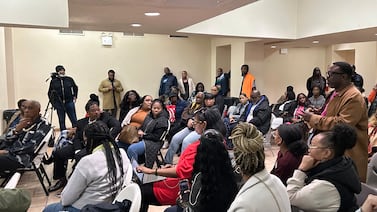Sign up for Chalkbeat New York’s free daily newsletter to keep up with NYC’s public schools.
The Regents exams, a rite of passage for New York students for more than a century, aren’t going anywhere.
But high school seniors in the coming years could see a big shift in what’s needed to graduate, with a slew of additional options to demonstrate mastery, as well as new subjects that could count towards their diplomas, including civic responsibility, financial literacy, and the arts.
A 64-member Blue Ribbon Commission, tasked more than a year ago with rethinking what knowledge and skills high schoolers should be required to know upon graduation, released its findings to the state’s Board of Regents on Monday.
Among its 12 recommendations is a move to further increase the number of assessment options beyond the Regents exams, offering students other ways to demonstrate their learning, such as performance-based assessments, capstone projects, and experiential learning. Other suggestions include broadening access to career and technical education, better aligning the state’s learning standards with college and career expectations, and enshrining instruction in culturally responsive-sustaining education practices in teacher preparation programs.
The recommendations also call for additional credit requirements in subjects like cultural competence, writing, STEM, and more.
But it may be some time before any of the recommendations are adopted.
In a press briefing last week, State Education Commissioner Betty Rosa called the report “a blueprint,” adding, “The real work starts with the design.”
State officials plan to take a “deeper dive” into each recommendation this summer, with hopes of developing timelines for implementation in the fall, she said.
State officials have debated future of Regents for years
The commission launched in 2022 after years of discussion over whether and how New York’s graduation policies should change.
In 2019, Rosa — then Chancellor of the Board of Regents — called for revising the state’s graduation requirements. She pointed to “stubborn gaps in achievement” that persisted between students of color, those with disabilities, English language learners, as well as those from low-income backgrounds compared with their white and more affluent peers.
Rosa is looking forward to a future of graduation assessments that are expansive — offering more options to students who may have struggled with the more traditional exams, she told reporters last week.
She hopes the new recommendations will establish a more inclusive learning environment, while building more opportunities for work-based learning and college readiness. She wants to move away from a “one-size-fits-all approach” and toward something “nurtures” students’ differences.
“Our students have different ways of demonstrating their knowledge,” she said. “What we want to do is uplift that.”
The future of Regents exams
The process of rethinking the state’s graduation requirements initially sparked speculation over the potential end of New York’s Regents exams, which have been offered since the 1870s and have been required of most students to earn their diplomas.
New York is one of a handful of states that still require exit exams, though research has found little evidence to show such exams improve student achievement.
Over the past year, the commission reviewed the state’s graduation requirements, as well as research findings, workforce trends, and community input. Members also considered graduation requirements, assessment options, apprenticeship models, and educational policies across other states and countries.
Parents and students involved in the process called for more flexibility in credit requirements and testing, according to the report. Many students reported feeling the Regents exams were not sufficient measures of student learning, calling for more project-based forms of assessments, as well as the option to replace the state tests with Advanced Placement or International Baccalaureate exams.
Angelique Johnson-Dingle, deputy commissioner of P-12 instructional support, said the state’s Education Department is already working to identify such alternative options and pathways for students.
“We have students that suffer with test anxiety that at times makes it difficult for them to be able to truly show everything that they’ve learned,” she said. “This is just one way to help those students — to give them another option to be able to meet the requirements of high school graduation.”
Some schools have already embraced alternative options. New York City already has nearly 40 schools that are part of a “performance standards consortium,” or “consortium” for short, that receive waivers from the state to forgo Regents exams, and instead have students work on projects or experiments and present their findings to a panel of educators and experts in what’s known as a “performance-based assessment.”
Kim Sweet, executive director of Advocates for Children of New York, called the proposed changes to diploma assessment requirements “an important step in the right direction. But her organization, which supports the most vulnerable students, is continuing to push for the state to unlink the Regents exams from graduation requirements, as many other states have done.
”There is no evidence that exit exams increase academic rigor or boost student learning, and they have been shown to increase drop-out rates, particularly for students of color and students from low-income backgrounds,” Sweet said in a statement. “We have worked with far too many students who had the deck stacked against them, yet persevered and completed their coursework and were prepared to move on to post-secondary life — only to be blocked from a high school diploma because of a single high-stakes exam.”
Meanwhile, Jacquelyn Martell, executive director of Education Reform Now New York, questioned whether the new assessments would be “objective” measures of whether students were prepared for college and careers after high school. The organization has advocated against changing graduation requirements, instead calling for the state to address systemic issues by further bolstering instruction in literacy, math, and other skills.
“New York must have true guardrails in place so when a high school senior receives their diploma, it’s not just a piece of paper,” she said in a statement. “Graduation needs to put our students on the path to success or they are doomed to failure.”
The commission’s recommendations additionally call for the number of diploma types to be reduced from three to one, while offering options to add seals or endorsements. Currently, the state doles out local, Regents, and Regents with advanced designation diplomas, which vary based on the number of assessments a student passed and the required passing scores.
In the report, commission members also developed a “portrait of a graduate,” or a set of attributes that New Yorkers should demonstrate upon graduation. Those included critical thinking, effective communication, cultural and social-emotional competences, innovative problem solving, literacy across content areas, and a status as a “global citizen.”
The portrait will serve as “the north star” of the state education system, according to the report.
Aaron Pallas, a professor at Columbia University’s Teachers College and an expert in testing, said the skills demonstrated by the portrait extended further than what exams had traditionally tested for.
“What I’m most struck by is the sheer amount of work necessary to convert the [Blue Ribbon Commission’s] portrait of a graduate into a set of standards and measures,” he said in an email. “Inevitably, this broad array of competencies we desire in a college and career-ready high school graduate argues for multiple forms of assessment, well beyond what historically has been measured by the Regents’ exams.”
See the commission’s full list of recommendations below:
- Replace the three diploma types with one diploma with the option to add seals and endorsements.
- Diploma credit requirements must include: > civic responsibility (ethics); > cultural competence; > financial literacy education, including systems, personal finance, and the social-historical context; > fine and performing arts; > science, technology, engineering, and mathematics (STEM) credit(s); and > writing, including writing skills for real-world scenarios.
- Ensure access to career and technical education (CTE), including internships and work-based learning opportunities for all students across New York State.
- Move to a model that organizes credit requirements, including content area credit requirements into larger categories (e.g., mathematics and science courses could be included in the “STEM” category). This model must: > allow for a competency-based (proficiency-based) model to award credit; > allow local districts to offer unique options for students to earn course credits (these options must reflect students’ identity and experiences); >increase the number of elective courses that may be used to fulfill credit requirements; and > provide student choice in the options used to satisfy the diploma credit requirements.
- Reduce and/or modify diploma assessment requirements to allow more assessment options. Such options must: > align with the Culturally Responsive-Sustaining Education Framework; > allow students to demonstrate competence in multiple ways; > assess the attributes included in the portrait of a graduate; > be available to all students; > include writing, including writing skills for real-world scenarios as an integral part; > measure higher-order thinking skills; >meet the needs of all learners, including English language learners, students with disabilities, and other underserved populations; and > provide student choice in the options used to satisfy the requirements including performance-based assessments (PBA), capstone projects, and experiential learning.
- Create state-developed rubric(s) for any performance-based assessments allowed as an option to satisfy the diploma assessment requirements. The Commission recommends convening P-20 teachers to develop performance-based assessment rubrics and create a curated collection of exemplars.
- Create more specific, tailored graduation requirements to address the unique circumstances of certain groups of students (e.g., non-compulsory age students, newcomer students, refugee students).
- Provide exemptions from diploma assessment requirements for: > students with significant cognitive disabilities and > major life events and extenuating circumstances (e.g., medical conditions, death of a family member, trauma prior to sitting for a required exam).
- Pursue regulatory changes to allow the discretion to confer high school degrees posthumously.
- Require all NYS teacher preparation programs to provide instruction in culturally responsive-sustaining education (CR-SE) practices and pedagogy.
- Require that professional development plans include culturally responsive-sustaining education practices and pedagogy.
- Review and revise the NYS learning standards to: > better align with college and career expectations, and update for family and consumer sciences, health, media literacy, and climate education; > emphasize higher-order skills and competencies (e.g., health education, communication, decision-making, time management, soft skills); and > use a culturally responsive-sustaining education (CRSE)/diversity, equity, and inclusion (DEI) and accessibility lens in all subject areas, including history.
Julian Shen-Berro is a reporter covering New York City. Contact him at jshen-berro@chalkbeat.org.






